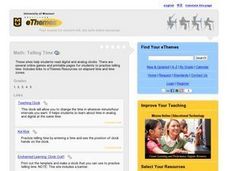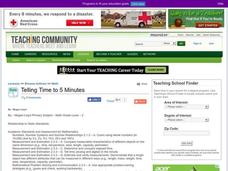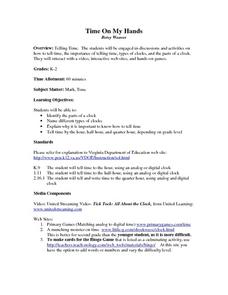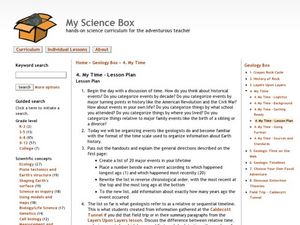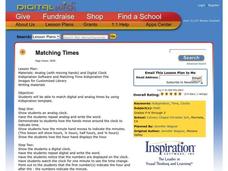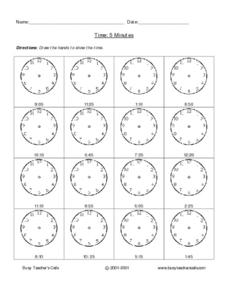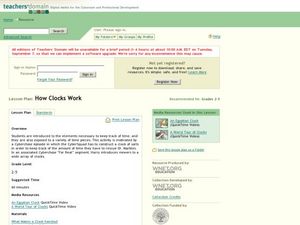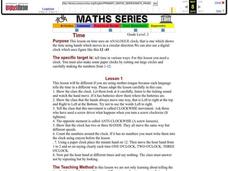Education World
Teaching Students to Tell Time: Three Resources for Busy Teachers
Elementary schoolers develop time-telling skills, one skill at a time. They examine the connection between time on digital and analog (clock-face) clocks. An excellent lesson on teaching how to tell time!
Illustrative Mathematics
Making a Clock
Have a fun time teaching children to read analog clocks with this whole-group math activity. Using large sets of the numerals 1-12 and 0, 5, 10...55, the teacher creates a large clock on either the carpet or the white board, explaining...
Curated OER
Telling Time With Clocks/Bingo “Time”
Young learners create a clock by adding hands and placing the numbers in the correct location. After each learner has their very own clock, they explore each component. Review on the hour times, and then introduce them to five-minute...
Curated OER
Telling Time Lesson Plan
Judy Clocks are a great invention. Here, learners review telling time to hour and half hour on Judy clocks, begin telling time to quarter hour, use clock stamps to practice, and play computer games using Trudy's Time and Place House...
Curated OER
Telling Time - Online Games
A variety of resources are included here that will help your young learners tell time using either an analog or digital clock. The first resource listed, called "Teach Clock" is amazing! You can add or subtract time. Post it on your...
Alabama Learning Exchange
Time to Tell Time
Students demonstrate how to tell time using an analog clock. In this time measurement lesson, students read the book Clocks and More Clocks and use analog clocks to demonstrate the time that the teacher called out.
Curated OER
Telling Time to 5 Minutes
In this second grade lesson your class will practice telling time. The goal is to tell time to five minutes using an analog clock. Your young students count by 5 minute intervals and discuss elapsed time.
Curated OER
It's About Time!
Students examine concept of time, and explore difference between analog and digital clocks; students make art project to represent time and create a time-story problem and solution.
Curated OER
Hickory Dickory Doc Tell Time
Students discover time keeping by reading clocks. In this time-telling lesson, students read the story Hickory Dickory Dock, and discuss the measurements of time we use. Students complete worksheets in which they identify the times of...
Curated OER
Telling Time
Young learners participate in activities which help them understand analog clocks, and the vocabulary of telling time. They examine the values of the intervals of minutes and hours by making a human clock.
Curated OER
Telling Time Bingo
Have your youngsters examine the difference between digital and analog clocks. Using They participate in a "Telling Time BINGO" game. Not only is this activity fun, but it provides the teacher with an opportunity to informally assess his...
Curated OER
Telling Time as an Everyday Use of Numbers
How can we estimate time? Have your young mathematicians make a clock. Then they compare and contrast types of clocks. They practice writing times in two different ways and make a book about telling time.
Curated OER
Time On My Hands
Young learners engage in discussions and activities on telling time, different types of clocks, and how the parts of a clock actually work. The engage in interactive websites, hands-on games, and watch a video on the art of the clock and...
Curated OER
Rock Around the Clock Math
An engaging and fun lesson on telling time is here for you. In it, young time-tellers listen to the song, "Rock Around the Clock," then use Judy Clocks to practice telling time to the hour and half hour. Finally, using paper plates, each...
Curated OER
My Time!
Learners explore how to tell time by looking at their daily schedule. Everyone's days start out the same (with school), but what does each learner do after school? How do they spend their time?
Curated OER
Tick Around the Clock
Young scholars examine and discuss the differences between clocks they are shown. Using the internet, they research how people used to tell time before clocks. They review what the long and short hand on the clock represent and practice...
Curated OER
Matching Times
Study digital and analog times on a clock with learners. They will use the Kidspiration template to create a digital and analog time display on the computer. They also display the correct times on both analog and digital clocks when the...
Curated OER
Telling Time: Two Ways to Read the Time
Second graders discuss the two different ways of reading time. They study the vocabulary "minutes to" and tell time in five minute intervals. They discuss why it is important to have schedules and students list some schedules that they...
Curated OER
1, 2, 3 o' Clock Rock
Second graders identify the hour and minute hands. They tell time by the hour, nearest quarter hour, half hour, and determine the relationships of time (e.g. minutes in hour, days in a month, weeks in a year). They create over-sized...
Curated OER
Time 5 Minutes
If your learners have already been introduced to telling time in five-minute intervals, this resource will provide extra practice! Or consider using it as a formal assessment. Have your learners developed time-telling skills?
Curated OER
How Clocks Work
Students discover time pieces and complete telling time activities. In this time lesson, students complete a worksheet about what make a clock keep time. Students watch a video about time and clocks as well as a video about an Egyptian...
Curated OER
It's About Time
First, second, and third graders explore elapsed time through estimation and prediction. They work with a partner to estimate how long it will take to perform various tasks. One person uses a stop watch to time his or her partner...
Curated OER
Time
Here, learners review telling time using an analog clock. They use a clock to tell time, make a paper clock, and discuss the concept of elapsed time. However, the lesson is not always easy to follow, nor are the questions clear.
Curated OER
Clock
Basic time-telling practice is the focus here.Youngsters discuss the different clocks they have in their homes, and practice filling in the time by adding the minute and hour hands to blank clock faces.






